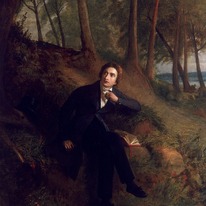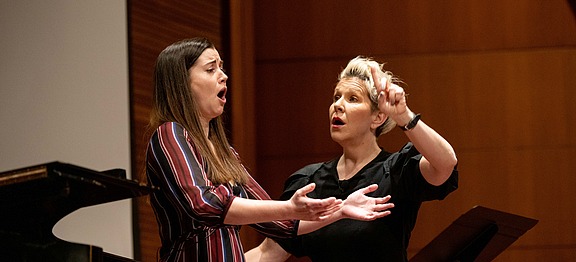Arts
The arts have been integral to life at the Institute for Advanced Study since its founding in 1930. The Institute’s motto, "Truth and Beauty," the work of founding Director Abraham Flexner (1930–39), can be traced to the final couplet of John Keats’s poem "Ode on a Grecian Urn":

Ye know on earth, and all ye need to know.
Flexner was a great lover of poetry and especially of Keats: he reportedly loved to recite "Ode on a Grecian Urn" from memory at private social gatherings. By drawing inspiration from a renowned Romantic poet to represent an institute focused on pushing the boundaries of knowledge, Flexner not only articulated his vision for the Institute as a place dedicated to the pursuit of fundamental discovery for its own sake, but also emphasized how deeply embedded the arts are within the fabric of the Institute.
The arts were also a central focus of Flexner’s IAS colleague Albert Einstein, founding Faculty member in the School of Mathematics/Natural Sciences (1933–55), who is often quoted as saying that he saw his life "in terms of music." Einstein was captivated by Mozart and Bach, played the violin, and held weekly recitals at his Mercer Street home. Likewise, J. Robert Oppenheimer, IAS Director (1947–66), was so inspired by literature that he named the Manhattan Project's "Trinity" nuclear test after a verse by English poet John Donne. A monument to Oppenheimer’s continued passion for the arts, and his dedication to the cross-pollination of knowledge across the arts and the sciences, stands outside the Historical Studies - Social Science Library in the form of the bronze Nike sculpture. The sculpture, erected at Oppenheimer’s behest in 1965, was made by his Los Alamos colleague Robert R. Wilson.
Wilson, a physicist who would go on to become the founding director of Fermilab (then the world’s largest particle accelerator), was also a practicing sculptor. Thus, the Nike sculpture, made by a physicist, which shares a name with the personification of Victory from ancient myth and stands outside a library dedicated to humanities research, is a powerful symbol—both of the centrality of the arts at the Institute for Advanced Study and of the harmonious blending of the sciences and humanities on campus.
The enduring legacy of Oppenheimer's boundary-crossing vision can still be seen today. The Institute’s artistic programming continues to open a window into shared experience, offering opportunities to engage in creative dialogue and enriching the cultural tapestry of the campus. Poets, dramatists, musicians, novelists, filmmakers, philosophers, and dancers still impact IAS scholars as they had Einstein and Oppenheimer before them.
The Institute hosts regular artistic programs ranging from intimate teatime pop-up performances to lectures, recitals, master classes, workshops, and Director's Conversations. Members of the public are frequently invited to join the IAS community in Wolfensohn Hall to partake in these artistic offerings.
Watch one of our most recent artistic highlights below and enjoy a full playlist of previous events on the Institute's YouTube channel.
In 1948, T.S. Eliot served as the Institute for Advanced Study's first, unofficial "artist in residence" during his time as a Member in the School of Historical Studies. He was hosted on campus by then-Director J. Robert Oppenheimer. Eliot's visit launched a tradition of welcoming dynamic and influential artists to IAS.
The official Artist-in-Residence program was established in 1994 to create a musical presence within the Institute community and to have in residence a person whose artistic work could be experienced and appreciated by scholars from all disciplines.
Pianist Robert Taub was the first Artist-in-Residence (1994–2001), followed by composers Jon Magnussen (2000–07) and Paul Moravec. Moravec served as both Artist-in-Residence (2007–08) and Artistic Consultant (2008–09). He was succeeded by Derek Bermel (2009–13), a composer, clarinetist, conductor, and jazz and rock musician, and Sebastian Currier (2013–6), whose work spans solo, chamber, and orchestral genres. Following this, Pulitzer Prize-winning composer David Lang served two terms as Artist-in-Residence (2016–23).
Artists-in-Residence at IAS have the opportunity to pursue their own creative and intellectual work as part of the Institute community and exchange ideas with its Faculty and Members. Nowhere has this been more manifest than in the work of Derek Bermel. While at the Institute, Bermel collaborated with Helmut Hofer, Hermann Weyl Professor in the School of Mathematics, on a musical piece inspired by Hofer's field of symplectic geometry. Bermel also composed a clarinet quintet titled "A Short History of the Universe (as related by Nima Arkani-Hamed),'' inspired by lectures delivered by the School of Natural Sciences Professor.
Visit the Institute's YouTube channel to watch a performance of "A Short History of the Universe... " as part of a retrospective concert performed by Bermel and the Jasper String Quartet in March 2024.
Traditionally curated by the Institute’s Artist-in-Residence, the Edward T. Cone concert series brings outstanding musical artists to campus to perform free concerts for the Institute community and the general public. Since 2007, the series has carried the name of the late Edward T. Cone, a distinguished composer and musical scholar with long-standing ties to the Institute. A founding member of the Friends of the Institute for Advanced Study, Cone was a tireless supporter of the arts and humanities at the Institute and beyond.
The Cone concert series has seen a wide variety of musical acts perform live in Wolfensohn Hall. This includes Trio Mediæval, who showcased Mediaeval carols from England and Scandinavia; Iranian harpsichordist Mahan Esfahani, who highlighted intricate and virtuosic compositions by two titans of Elizabethan music; Haitian-American composer, singer, and flutist Nathalie Joachim, who treated audiences to a composition exploring her connections to her family, heritage, and artistic roots; and women's chorus Lorelei Ensemble, who are recognized across the globe for championing the extraordinary flexibility of the human voice.
Constructed between 1991–93, the Institute for Advanced Study's 220-seat Wolfensohn Hall was built to serve as a venue for both lectures and concerts. The first new construction on the Institute campus since 1969, the Hall was designed by Caesar Pelli and Associates. The auditorium was named for James Wolfensohn, a former President of the World Bank and the longest-serving Chair of the Institute's Board of Trustees (1986–2007), and his wife Elaine.
Dubbed "an instrument for sound,'' the Hall boasts curving side wall panels made from wood, articulated by horizontal stripes of red fabric covering. To attain acoustic excellence, the project’s designer, Jeff Paine, worked closely with the Boston-based acoustical design firm Acentech. The design features open trusses overhead, allowing the uninhibited resonance of sound. The only structures which absorb sound are located in the rear wall, preventing sound from bouncing back toward the stage.
An amateur cellist, Wolfensohn was a true patron of the arts. His old friend, violinist Isaac Stern, surprised the Institute community by playing Wolfensohn Hall's inaugural concert in April 1993. Stern shared the program with Wolfensohn's daughter Sara, an accomplished pianist.
